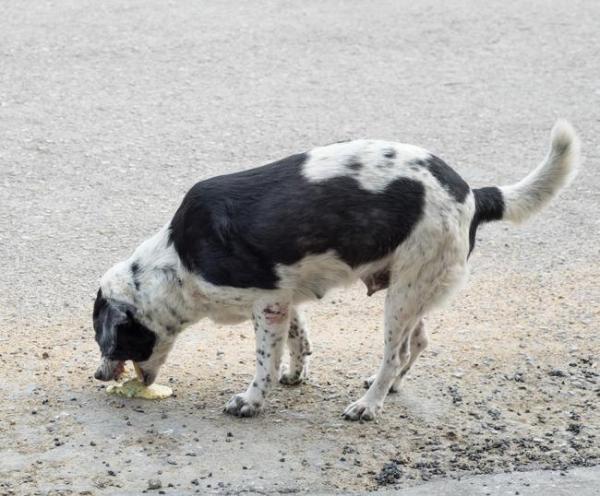Is Epazote Poisonous to Dogs?



See files for Dogs
Epazote (Dysphania ambrosioides), also known as Jesuit's tea or Mexican-tea, is an aromatic herb widely used in South and Central America. Its usage dates back to the Pre-Hispanic era and its name derives from the Aztec language “epaztl”, which translates as “skunk”. In addition to being used in many Mexican dishes, it is also consumed as a herbal tea for its pungent taste. Moreover, there are many medicinal properties attributed to it, particularly in relation to skin and digestive problems. However, is epazote safe to use in pets?
In this AnimalWised article, we talk about epazote, explain its use in animals and humans, and answer the question: Is epazote poisonous to dogs?
Is epazote poisonous to dogs?
According to the American Society for the Prevention of Cruelty to Animals (ASPCA), epazote is toxic to dogs, cats, and horses if ingested. In fact, epazote oil has proved to be highly toxic for dogs, even in small doses. The high toxicity of epazote is due to the presence of ascaridol, a compound that is extremely poisonous to animals.
However, used topically, there are people who argue that epazote may be beneficial for dogs, although it has not been scientifically proven yet. A study, conducted in 2018 by the Federal University of Piauí, focused on the most used medicinal plants for animals in Brazil. It concluded that this plant was used to treat cases of skin infections, parasites, dislocations, and fractures. However, the same study pointed out that its effectiveness has little scientific evidence.
At AnimalWised we consider that, despite popular belief, epazote should not be used in dogs under any circumstance. Even if it proves to be safe when used topically, the dog might still ingest it. Remember that epazote is used to treat wounds, and dogs tend to lick areas where they feel irritation or have wounds.
Symptoms of epazote poisoning in dogs
If your dog accidentally ingests epazote, it is important to try to determine how much has the dog ingested and to take a small sample of the plant in case it could be useful in further examinations. Then, it is critical to get in touch with your trusted veterinarian as soon as possible and wait for instructions. In the meantime, it is essential to take note of your dog's symptoms and keep an eye on their body temperature. The following are the most common symptoms of epazote poisoning in dogs:
- vomiting
- fever
- diarrhea
- loss of appetite
- soft spot
- tremors
The extent of these symptoms can vary depending on the amount of epazote your dog ingested. In case the dog is allergic to the plant, you can also expect bloody diarrhea, as well as anaphylactic shock.
To know more about what to do in case your dog ingests something toxic and starts presenting these symptoms, keep reading this article on dog poisoning.

Can epazote be used to deworm dogs?
There has not been enough research to prove the effectiveness of epazote as a dewormer in animals, despite its use in Brazil and Mexico. So, is it safe to use epazote to deworm dogs? It is preferable to avoid it until further research has been conducted. There are many effective veterinary prescription antiparasitics or home remedies that have proven to be perfectly safe in dogs.
If you wish to know more about natural dewormers, don't miss this article on how to treat dog worms at home.
Other popular uses of epazote
Epazote is believed to strengthen the immune system in humans, fighting respiratory ailments such as bronchitis and tuberculosis. It has also proven to be successful at relieving inflammation when suffering from joint problems like osteoarthritis. Many people place the leaves of the herbs on wounds to speed healing. There are several studies that have concluded that epazote helps fight inflammation and promotes healing, so it can be used to reduce the symptoms of some cutaneous diseases such as leishmaniasis. Additionally, the herb is used to improve digestion, lower blood pressure, fight bacterial infections, and even prevent osteoporosis.
Now, all these uses are common in people, which might explain why so many people venture to use epazote in dogs with similar issues. However, we insist on the fact that there is no conclusive scientific evidence to support that this herb is beneficial to animals.
If your dog suffers from any of the aforementioned issues, keep in mind that there are many safe alternatives you can use to treat them.
This article is purely informative. AnimalWised does not have the authority to prescribe any veterinary treatment or create a diagnosis. We invite you to take your pet to the veterinarian if they are suffering from any condition or pain.
If you want to read similar articles to Is Epazote Poisonous to Dogs?, we recommend you visit our Home Remedies category.
- ASPCA. Epazote . Available at: https://www.aspca.org/pet-care/animal-poison-control/toxic-and-non-toxic-plants/epazote.
- ScienceDirect. Veterinary Herbal Medicine. Available at: https://www.sciencedirect.com/book/9780323029988/veterinary-herbal-medicine.
- Youtube. Can the puppy take Mastruz or Erva de Santa Maria? Available at: https://www.youtube.com/watch?v=799Uzg3ouIg.
- Pubvet. Ethnoveterinary study of dedicated plants used in the micro-region of Alto Médio Gurguéia-Piauí . Available at: file: /// C: /Users/gmr-ofi-34/Downloads/estudo-etnoveterinaacuterio-de-plantas.pdf.
- UERN portal. Investigation confirms effect of mastruz against Leishmania . Available at: http://portal.uern.br/blog/pesquisa-comprova-efeito-do-mastruz-contr-a-leishmaniose.
- Gómez Castellanos, JR Epazote (Chenodium ambrosioides). Review of its morphological characteristics, pharmacological activity and biogenesis of its main active principle, ascaridol . Latin American and Caribbean Bulletin of Medicinal and Aromatic Plants.






